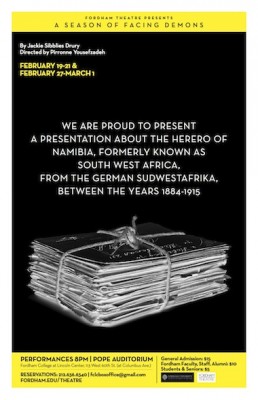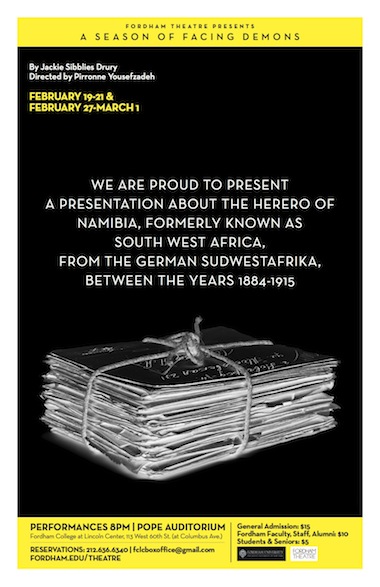Everyone Is Asking Questions About FCLC’s Next Mainstage

Property of Fordham University Theater Company.
February 13, 2014
“We Are Proud to Present a Presentation About the Herero of Namibia, Formerly Known as South West Africa, From the German Sudwestafrika, Between the Years 1884-1915,” Fordham College at Lincoln Center’s (FCLC) newest mainstage production to debut Wednesday, Feb. 19, “will be like nothing you’ve ever seen, I can guarantee you,” Winter Dunn, FCLC’14 and an actress in the play, said.

Try to follow this: “It’s actors, playing actors, doing a play, about doing a play,” Beth Goldenberg, costume designer for “We Are Proud to Present a Presentation About the Herero of Namibia” and assistant costume designer for “Chaplin” on Broadway, said.
The presentation that the characters rehearse and perform throughout the play discusses a genocide that took place in German South West Africa, around the turn of the 20th century. The Herero tribe, who lived in modern-day Namibia, rebelled against German colonizers, resulting in the systematic extermination of their tribe. There is little documentation on this particular genocide.
Don’t let its long name intimidate you. “The title is long and exhausting and we get that. But that’s kind of the point. This play is funny, goofy and quirky,” Dunn said. “But at the same time, it’s deep, intellectual and forces you to acknowledge a history that has been ignored for a very long time and you see these kids trying to bring it back.”
Even more challenging for this production is the fact that “there’s very little, maybe nothing, from the perspective of the Herero [tribe],” Shonni Enelow, assistant professor of English, said. Enelow offered her assistance as a dramaturg to the mainstage production because of the questions it evokes in the characters and audience alike. In general, a dramaturg is responsible for keeping track of the text.
“A dramaturg is kind of like a resident scholar, who knows a lot about the play, when it was written, its cultural context and works with the director to make it into a meaningful theatrical production,” Enelow said.
“The problem the characters run into in this play is that they start with the story of killers, the victors, the perpetrators of this genocide,” Enelow said. “So, how could these characters even begin to get inside and identify with these people who are so opaque to them?”
The playwright Jackie Sibblies Drury did not name any of these characters. Instead, in the script written less than five years ago, the actors are referred to by only race and gender, two roles in society that the play will explore and question. Dunn plays a character who is identified in the script simply as “black woman.”
There are six characters: three black, three white, two males and one female of each. “Without giving too much away about the play, these characters have to decide how they are going to delineate the roles. There’s a contentious discussion of, ‘Could you play a German?’ ‘Could you play an African?’ and ‘Could the roles be reversed?’,” Enelow said.
Goldenberg explained that this production switches from the characters rehearsing a presentation and performing it. The lines between rehearsal and performance begin to blur until “both times exist at once.” Ultimately, “it’s about the creation of a piece of theater, while you are also simultaneously watching that piece of theater,” Goldenberg said.
Interpretation has many layers in this play. The characters in the play interpret the history and those involved, while Fordham students interpret their characters and their characters’ interpretation of the play. While Enelow pointed out the difficulties the actors in the play experience in relating to the soldiers and the killers, Dunn finds many aspects of the characters themselves to be accessible.
“This play is about a group of twenty-something-year-old people, who consider themselves theater artists, trying to put on a presentation about a genocide,” Dunn said. The characters’ ages especially helped Dunn relate to her role. “I have been this person. I might not say all the things she says, might not end where she ends up, but I get this girl, I know this girl. And many times, I am her.”
However, she takes the relationship to the characters further than this simple age comparison. “It’s kind of creepy how much you relate to what they are saying,” Dunn said.
“That’s why it’s intellectual because then you have to question why what they are saying isn’t too far from what you would say,” Dunn said. “This play sparks genuine questions to ask yourself.”
IF YOU GO
We Are Proud to Present a Presenation About the Herero of Namibia
When: February 19-21 & February 27-March 1
Where: Pope Auditorium (113 West 60th Street)
Price: General Admission: $15
Fordham Alumni and Faculty: $10
Students and Senior Citizens: $5











